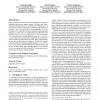Free Online Productivity Tools
i2Speak
i2Symbol
i2OCR
iTex2Img
iWeb2Print
iWeb2Shot
i2Type
iPdf2Split
iPdf2Merge
i2Bopomofo
i2Arabic
i2Style
i2Image
i2PDF
iLatex2Rtf
Sci2ools
115
click to vote
RECSYS
2009
ACM
2009
ACM
Preference elicitation with subjective features
Utility or preference elicitation is a critical component in many recommender and decision support systems. However, most frameworks for elicitation assume a predefined set of features (e.g., as derived from catalog descriptions) over which user preferences are expressed. Just as user preferences vary considerably, so too can the features over which they are most comfortable expressing these preferences. In this work, we consider preference elicitation in the presence of subjective or user-defined features. We treat the problem of learning a user’s feature definition as one of concept learning, but whose goal is to learn only enough about the concept definition to enable a good decision to be made. This is complicated by the fact that user preferences are unknown. We describe computational procedures for identifying optimal alternatives w.r.t minimax regret in the presence of both utility and concept uncertainty; and develop several heuristic query strategies that focus on reduc...
Related Content
| Added | 28 May 2010 |
| Updated | 28 May 2010 |
| Type | Conference |
| Year | 2009 |
| Where | RECSYS |
| Authors | Craig Boutilier, Kevin Regan, Paolo Viappiani |
Comments (0)

